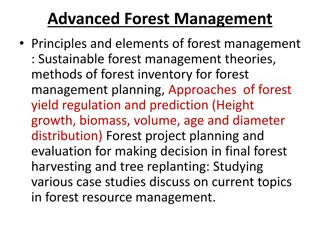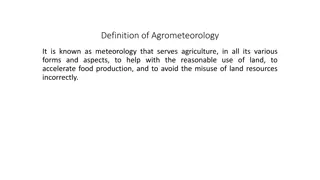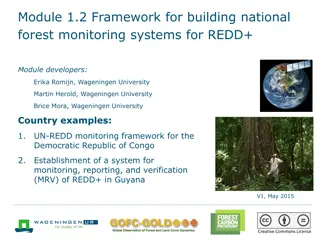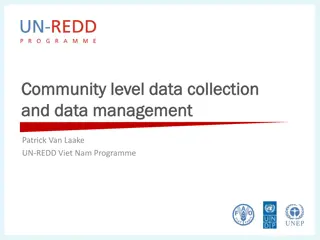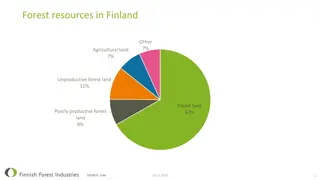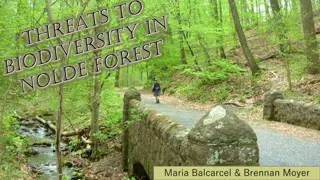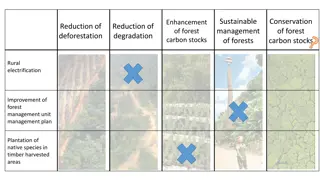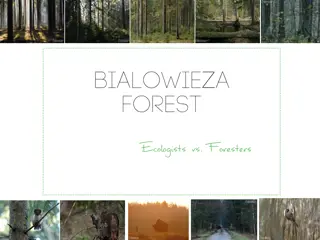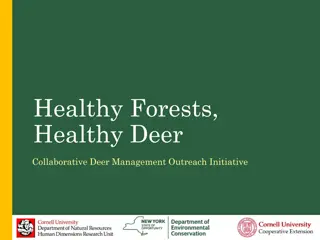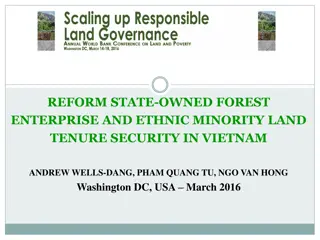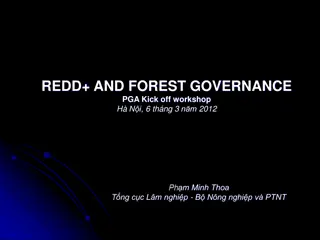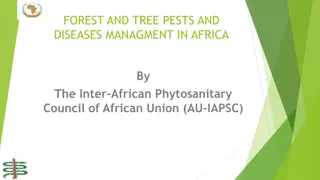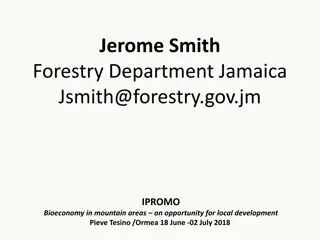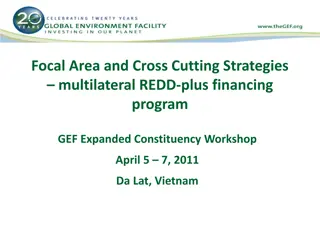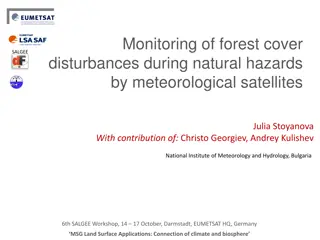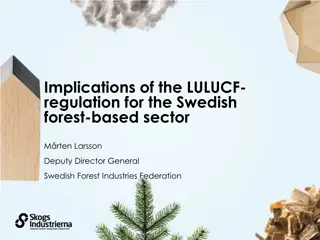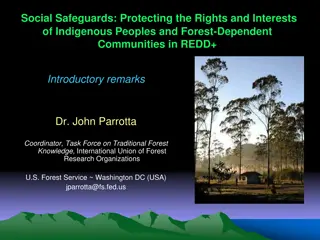Wildland Fire Overview in Canada: 2023 Season Update
Wildland fires in Canada are becoming increasingly severe due to climate change, with a high risk to Indigenous communities. The 2023 season has seen a significant increase in the area burned, with active fires posing risks to remote areas. National efforts are in place to manage these fires, with a
0 views • 14 slides
Tamil Nadu Forest Uniformed Service Recruitment Committee (TNFUSRC)
Tamil Nadu Forest Uniformed Service Recruitment Committee (TNFUSRC)\nThe Tamil Nadu Forest Uniformed Services Recruitment Committee (TNFUSRC) is an organization responsible for recruiting candidates for various uniformed services positions within the Tamil Nadu Forest Department.\nSelection process
0 views • 5 slides
California Forest Improvement Program (CFIP) Overview
The California Forest Improvement Program (CFIP) aims to promote investments in forestlands to ensure timber supplies, employment, and economic benefits while enhancing the forest resource. Funding sources, program objectives, eligibility requirements, and reimbursement details are covered in the pr
1 views • 22 slides
Understanding Forest Fires and Their Causes in India
Forest fires have become increasingly common in India, with recent incidents in various states causing significant damage to biodiversity and ecology. Factors such as smoking, campfires, fireworks, burning debris, and natural causes like lightning contribute to the occurrence of these devastating fi
0 views • 13 slides
Principles of Advanced Forest Management
Explore sustainable forest management theories, inventory methods, yield regulation approaches, and project planning for effective decision-making in forest resource management. Delve into the principles of forest management, land classification, growth projection, yield prediction, and sustainable
0 views • 26 slides
Insights into Agrometeorology: Importance, Applications, and Impact
Agrometeorology serves agriculture by aiding in land use, food production, and resource management. It plays a crucial role in strategic agricultural decisions, such as irrigation schemes, crop selection, and machinery use. Weather forecasts and climate patterns are key for effective planning, espec
0 views • 8 slides
Importance of Fire Safety Education in Preventing Home Fires
Attitudes and education play a crucial role in shaping people's perceptions of fire safety. Many individuals overlook the importance of fire safety, assuming it won't happen to them. However, the reality is that fires can occur quickly, especially with modern home construction materials. This emphas
0 views • 16 slides
Essential Fire Fighting Equipment Onboard Ships
Ships are equipped with essential fire-fighting equipment such as fire pumps, hydrants, hoses, extinguishers, and more. Fire pumps play a crucial role in supplying water at high pressure to the sprinkler system. Fire hydrants provide access to water for firefighting, while fire extinguishers are use
0 views • 7 slides
Operating Room Fire Safety Guidelines
Response to operating room fires should be immediate. It is a shared responsibility of the surgical team to prevent fires by conducting annual fire safety education, following evacuation policies, and assessing fire risks in the OR. The AORN Fire Triangle highlights the elements necessary for a fire
1 views • 21 slides
How Racking Safety Can Prevent Warehouse Fires?
Racking safety is just one part of a larger commitment to safety in general \u2014 and warehouse fires are just one of the many things which adhering to warehouse safety can prevent.\n\n\/\/seerackinginspections.co.uk\/racking-safety-prevent-warehous
3 views • 3 slides
Framework for Building National Forest Monitoring Systems for REDD+
This module outlines a comprehensive framework for developing national forest monitoring systems for REDD+ initiatives. It covers key components such as satellite land monitoring, national forest inventories, greenhouse gas reporting, emission factors, and integrated monitoring systems focusing on c
0 views • 14 slides
Community-Based Data Collection and Forest Management for REDD+ Initiatives
Participatory approaches in forest management by local communities have shown success in conservation efforts. Ownership, long-term commitment, and social pressures play key roles. Additionally, secondary uses of the forest, carbon assessment by communities, supplementary data collection, and effici
0 views • 12 slides
Kitchen Safety Tips: Preventing and Extinguishing Fires
Learn essential kitchen safety tips to prevent and extinguish different types of fires, including grease fires, oven fires, microwave fires, appliance fires, clothing fires, and electrical fires. Follow guidelines such as maintaining cleanliness, staying alert, using fire extinguishers, and creating
0 views • 11 slides
Lithium Battery Fire Safety Awareness Campaign by LFB
Aimed at raising awareness about the increasing risks of lithium battery fires, the London Fire Brigade (LFB) has initiated the #chargesafe campaign. Highlighting the dangers associated with e-bike and e-scooter fires, the campaign emphasizes key messages such as proper storage and charging practice
0 views • 13 slides
The Legend of Sherwood Forest: From Royal Hunting Reserve to Nature Reserve
Sherwood Forest, once a royal hunting reserve in the 10th Century, is renowned for its association with the legendary figure Robin Hood. The forest provided cover for both hunting and outlaws, eventually becoming a nature reserve attracting millions of visitors annually. Despite its reduced size fro
0 views • 9 slides
Overview of Forest Resources in Finland
Forest resources in Finland consist of various types of land, with forest land being the most dominant at 67%. Pine and spruce are the most common tree species, making up 80% of the total volume. Private forest owners own a significant portion of forest land at 60%. The growth of Finnish forests is
2 views • 6 slides
Forest Resources and Challenges in India: A Detailed Overview
India's forest resources face challenges due to degradation, impacting the economy and environment. The country produces a range of forest products, with forestry contributing to GDP. However, unsustainable practices such as excessive fuelwood consumption pose threats. Non-wood forest products are s
0 views • 48 slides
Essential Firefighting Equipment on Ships
Shipboard fires are a significant risk due to high temperatures and flammable materials. To prevent and combat fires effectively, ships are equipped with fire retardant bulkheads, fire doors, fire dampers, fire pumps, fire main piping and valves, as well as fire hose and nozzles. These essential fir
0 views • 18 slides
Alaska Wildfires 2017: Overview and Response Efforts
The 2017 Alaska fire season from January 1 to September 15 saw 353 fires covering 652K acres, with 43% caused by natural factors and 57% by human actions. The Alaska Fire Service managed 169 fires in the Upper Yukon Zone, while the state of Alaska dealt with 170 fires and 154 prevention actions. Var
1 views • 13 slides
vFireLib: Forest Fire Simulation Library on GPU
Dive into Jessica Smith's thesis defense on vFireLib, a forest fire simulation library implemented on the GPU. The research focuses on real-time GPU-based wildfire simulation for effective and safe wildfire suppression efforts, aiming to reduce costs and mitigate loss of habitat, property, and life.
0 views • 95 slides
Understanding Smouldering Fires in Buildings: Impact, Mechanism, and Characteristics
Explore the potential dangers of smouldering fires in buildings, their slow-burning nature, and the impact on occupants. Learn about the mechanism of smouldering combustion, its characteristics including low temperature and spread rate, and sources of information from the SFPE Handbook. Discover how
0 views • 17 slides
Conservation Efforts and Threats to Biodiversity at Nolde Forest
Nolde Forest State Park, established by hosiery baron Jacob Nolde in the early 1900s, is a lush coniferous forest now dedicated to environmental education. The park faces threats to biodiversity such as natural disasters, invasive species, and human activity. Hurricane Sandy's impact in 2012 and the
2 views • 13 slides
Sustainable Forest Management for Carbon Conservation and Biodiversity Enhancement
Sustainable forest management practices focused on conservation and enhancement of forest carbon stocks, reduction of deforestation and degradation, rural electrification, and improvement of forest management unit plans. Initiatives include assessment of forest resources, capacity building for field
1 views • 4 slides
Białowieża Forest: Europe's Last Primeval Forest
Białowieża Forest, the largest natural forest complex in the Central European Lowlands, is a treasure trove of diverse forest communities and abundant wildlife. Protected since ancient times, it faces threats like the European spruce bark beetle. Ecologists advocate for forest conservation to pres
0 views • 13 slides
Kitchen Safety Training for Preventing Burns and Fires
Learn about preventing burns and kitchen fires with this comprehensive training from the Bureau of Workers' Compensation in Pennsylvania. Discover the degrees of burns, first aid tips, deep fat fryer safety, burn prevention tips, and more. Stay safe in the kitchen by understanding how to handle burn
0 views • 24 slides
Understanding Deer Impact on Forest Regeneration
Explore the collaborative deer management outreach initiative focused on maintaining healthy forests by addressing the impact of white-tailed deer on forest regeneration. Learn about the factors influencing forest health, predicted regeneration of tree species, and survey results on forest regenerat
0 views • 27 slides
Reforming State-Owned Forest Enterprises and Ensuring Ethnic Minority Land Tenure Security in Vietnam
Vietnamese government nationalized agricultural and forest land in the 1950s, impacting ethnic minority groups. Despite attempts to reform state-owned forest enterprises, conflicts over forest land persist. This study examines policies, processes, and conflicts in three provinces to offer recommenda
0 views • 20 slides
Understanding REDD+ and Forest Governance for Sustainable Resource Management
REDD+ stands for Reducing Emissions from Deforestation and forest Degradation, encompassing activities to enhance carbon stocks, conservation, and sustainable forest management. Forest governance plays a crucial role in reducing risks related to land use change, illegal logging, and forest degradati
0 views • 11 slides
Forest and Tree Pests and Diseases Management in Africa
The management of forest pests and diseases in Africa is crucial to safeguard the continent's forests, international trade, and forest products. This presentation provides insights into the occurrence, distribution, economic impacts, and regional cooperation for managing forest pests. Major pests an
0 views • 12 slides
Jerome Smith - Forest Department Director Promoting Bioeconomy in Mountain Areas
Jerome Smith is the Principal Director of Forest Operations in Jamaica, focusing on environmental policies and sustainable forest management. He has spearheaded various programs, including the EU-supported initiative to address climate change challenges through improved forest management in Jamaica.
0 views • 8 slides
FEAD Committee Meeting on Security and Fires in Waste Management Facilities
The FEAD Committee's upcoming meeting on 14th February 2023 will cover various legislative updates and discussions on security and fires in waste management facilities. The agenda includes updates on legislative files, such as the revision of EU legislation on hazard classification and waste shipmen
0 views • 23 slides
Optimal Sustainable Control of Forest Sector with Stochastic Dynamic Programming and Markov Chains
Stochastic dynamic programming with Markov chains is used for optimal control of the forest sector, focusing on continuous cover forestry. This approach optimizes forest industry production, harvest levels, and logistic solutions based on market conditions. The method involves solving quadratic prog
0 views • 27 slides
Assessing Forest Loss in Protected Areas: A Philippines Case Study
The study assesses forest cover loss in terrestrial protected areas of the Philippines, analyzing the extent and rate of deforestation using Hansen's Global Forest Cover Change datasets. The research aims to understand the drivers of deforestation in protected areas, comparing forest loss in the ent
0 views • 24 slides
Forest Fires in Russia: A Case Study of the Catastrophic Events in 2010
The forest fires in Russia during the summer of 2010 led to significant devastation, including burning living buildings and threatening nuclear centers. The lack of support for forestry and fire-prevention measures in the 1990s worsened the situation, causing uncontrolled spread of fires. Toxic smok
0 views • 41 slides
Understanding Calcium Influence on Earthworm Behavior in Forest Ecosystems
Earthworm biomass dominance by Lumbricus terrestris in the Siemianice Experimental Forest is linked to their high calcium requirements, as indicated by their calciferous glands producing calcium carbonate to regulate blood pH in the face of high soil CO2 levels. The positive relationship between for
0 views • 8 slides
GEF Forest Investments and Sustainability Strategies
The Global Environment Facility (GEF) focuses on financing forest projects to address climate change, biodiversity conservation, and land degradation. With a history of investing in forests since 1991, GEF has created programs like GEF-5 SFM/REDD-plus to generate multiple environmental and social be
0 views • 11 slides
Monitoring Forest Cover Disturbances During Natural Hazards by Meteorological Satellites
Ecosystem functioning relies on energy, water, and carbon fluxes regulated by vegetation and soil properties. This study focuses on monitoring forest cover disturbances before, during, and after natural hazards using meteorological satellites. It involves analyzing land surface temperature, evapotra
0 views • 37 slides
Implications of LULUCF Regulation for Swedish Forest Sector
The Swedish Forest Industries Federation discusses the implications of LULUCF regulation on the forest-based sector in Sweden, aiming for a fossil-free welfare state by 2045. The sector plays a vital role in driving growth in the global bioeconomy, with sustainable forest management strategies highl
0 views • 14 slides
Empowering Communities Through Micro Planning for Forest Development
Micro Planning is a community-based process empowering forest-dependent communities to create a roadmap for sustainable development. Joint Forest Management Committees and other bodies organize the preparation of ten-year development plans prioritizing activities for enhanced livelihoods. The proces
0 views • 15 slides
Safeguarding Indigenous Peoples and Forest Communities in REDD+
Exploring traditional forest knowledge and its importance to culture, livelihoods, and conservation efforts. The IUFRO Task Force focuses on preserving traditional knowledge, addressing threats, and identifying opportunities for collaboration with modern forest science. Unique features include susta
0 views • 10 slides




